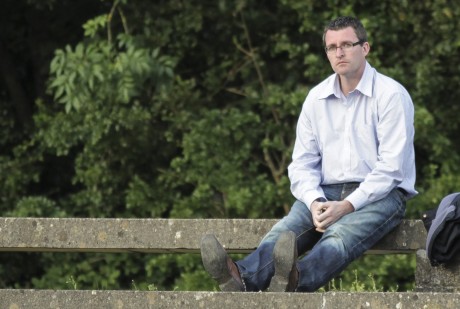
Peter Darragh Quinn
Peter Darragh Quinn, the nephew of former Quinn Group owner Sean Quinn has been declared bankrupt over alleged debts of €146m.
The joint liquidators of the Irish Bank Resolution Corporation obtained the order against Peter Darragh Quinn at the High Court in Belfast on September 8, and the notice was published in the Belfast Telegraph on Friday past.
Peter Quinn, whose address is listed as Sessiagh East, Innishmore, Lisbellaw, still faces arrest if he enters the South after he failed to appear in court in July 2012. He had been due to be sentenced for contempt after a Dublin court ruled he put assets beyond the reach of Anglo Irish Bank.
A warrant for Peter Quinn’s arrest was issued in the South in July 2012 and remains in place.
By securing the bankruptcy adjudication against him in Belfast, IBRC can now go after any assets held by Peter Quinn.
The bankruptcy petition against him states: “The debtor is justly and truly indebted to us in the sum of $188m, together with interest at the rate of 8% from 29 July 2013.
“This sum is due on foot of an order of the High Court of Ireland.”
It adds: “The above mentioned debt is for a liquidated sum payable immediately and the debtor appears to be unable to pay it.”
Debt Mediation specialist, Darwin Allen, who is the Senior Relationship at GDP Partnership now leads his firm’s Equity Experts division.
A native of Fermanagh, he explained that bankruptcy “should always be the last resort.”
He went on: “There are three ways to deal with unaffordable debt: one – mediate through an intermediary, two – offer a voluntary insolvency process (Debt Management Plan or Voluntary Arrangement), and three – bankruptcy.
Mr Allen explained that going bankrupt in Northern Ireland can create difficulties in day to day life and it is not as simple as being freed from debts you cannot pay.
“The Trustee will tell your creditors you are bankrupt, and it is illegal if you pay any creditor as a preference, even family or friends. You will no longer legally control your own assets.
“For an example, if you own your home, your share of the equity in the home will form part of your estate and may have to be sold to go towards paying your debts.
“Your bank accounts will immediately be frozen and ultimately shut down, and you have to give your cheque books and bank cards to the Trustee.”
Mr Allen believes Fermanagh has been hit harder than most areas when it comes to debt, with the same information not readily available in the county than in other areas of the North.
“Fermanagh has always sat on the periphery and does not appear to have the same access to information as those closer to Belfast.
“I have many clients based in Fermanagh, and it is clear with the bankruptcies of local business leaders of late, that debt is impacting the people of this region more than most.”








